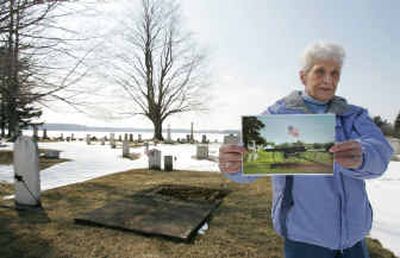Town’s cannon secretly sold

KENDALL, N.Y. – Driving down to the village on a weekend errand, Colin Zimmerman passed tiny Greenwood Cemetery and did a double-take: The 816-pound cast iron cannon that had adorned the graves of Civil War veterans for more than a century was gone.
“I just couldn’t believe it,” said Zimmerman, 45, a utility foreman. “I’m saying to myself, ‘Where the heck is it?’ “
The Union muzzleloader, forged in 1862, was quietly sold in December to the Civil War Artillery Museum near Pittsburgh and hauled away a few weeks ago. The five-member town board accepted $15,000, plus a replica cannon worth $5,000, and purposely told only a few people.
Protesters think the town of 2,800 people in farm country near Lake Ontario was duped into selling off a vital piece of its heritage, but Town Supervisor John Becker said the money went into a trust fund to help pay for the cemetery’s upkeep. The replica will be installed soon, he said.
Thousands of obsolete cannons were given to veterans groups, cemetery associations and municipalities in the half-century after the Civil War. Many were melted down in scrap metal drives during the world wars and fewer than 5,700 are known to survive.
“I could guarantee you that if you removed a veterans item from World War II, that might be the last election you ever won,” said Michael Aikey, director of the New York State Military Museum in Saratoga Springs. “The federal government doesn’t give things away. Most ordnance pieces in cemeteries and public areas are really on loan.”
However, the government also sold many surplus arms to businesses that later resold them, muddying the ownership trail of undocumented cannons like Kendall’s, said artillery expert Wayne Stark, who maintains a “National Registry of Surviving Civil War Artillery.”
“Every place is different,” Stark said. “Some maintain the cannons, and I’d rather see them stay there, but so many are ignored. If it takes private ownership to save them, that’s better than them rusting away and disappearing.”
Greenwood Cemetery sits on about five acres of land donated by a Revolutionary War soldier. Around a concrete base where the cannon once stood are the white marble gravestones of Civil War veterans.
“Those men died for us,” Zimmerman said with a trembling voice. “My dad was in the service and so was his dad, and there’s kids dying right now over in Iraq so that I have the opportunity to voice my concerns.”
The four-year-old artillery museum in Venetia, Pa., boasts the nation’s second biggest private collection of Civil War artillery, with 26 cannons, howitzers and mortars.
Owner Kenneth Watterson, a retired manufacturing executive, opens the museum next to his home by appointment only, drawing a few hundred visitors a year, and is preparing to move it to Philadelphia.
Watterson wouldn’t discuss the Kendall controversy, insisting that “it’s a legal sale.”
Last year, he returned two cannons he’d bought for $70,000 from an American Legion post in Summit Hill, Pa. The town claimed rightful ownership and “a court case would have cost more than the cannons were worth,” Watterson said. “But it was the right thing to do.”
His assistant curator, Bruce Stiles, started making offers for Kendall’s cannon in 2000.
“When he said $20,000, we said, ‘Wait a minute, now we have something that people will steal,’ ” said Becker, the supervisor.
The board obtained the backing of several prominent families in town, but, fearful of attracting thieves, kept the deal largely under wraps, Becker said.
“I think the board made the right decision,” Becker said. “Yes, there will be some people I’m sure who don’t agree with that, but this is America, they’re allowed to do that.”